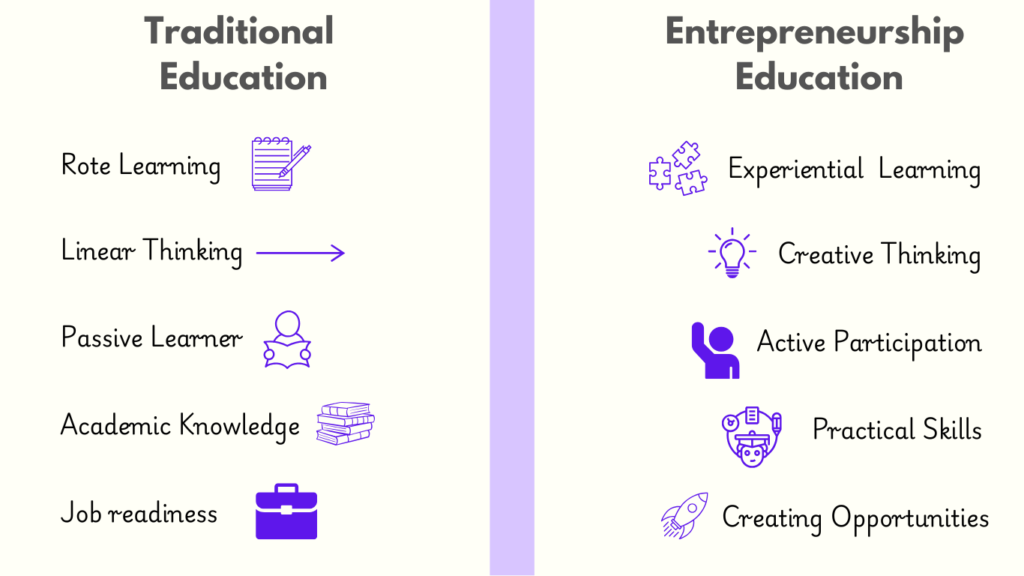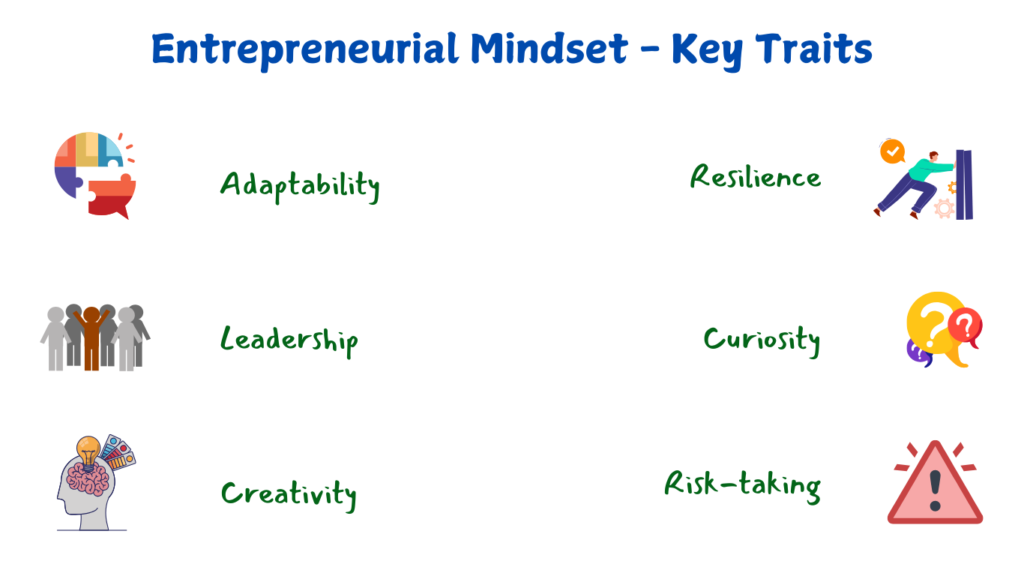There’s a noticeable shift happening in households today.
Families are moving away from the traditional mindset of pursuing careers like software engineering or medicine as the only path to success, and are now encouraging entrepreneurship as a new way to achieve success.
These days, being an entrepreneur is often seen as being on par with celebrity status and wealth.
But let’s be realistic; being an entrepreneur can lead to success and wealth, but it also entails its own set of risks and challenges.
As the saying goes:
With great risks come great rewards!
This is especially true in the world of entrepreneurship.
With the world changing at a rapid pace and innovation at its peak, let’s understand how learning about entrepreneurship in modern education is becoming a focal point and helping individuals navigate the challenges and opportunities of starting their own businesses.
Also read: Traditional Education vs Modern Education
What is Entrepreneurship?
Entrepreneurship is the process of designing, launching, and running a new business, often initially a small business. It involves taking risks in order to achieve success and create wealth through innovation and creativity.
Who is an Entrepreneur?
An entrepreneur is someone who identifies a business opportunity and takes the initiative to pursue it, often with limited resources and a willingness to adapt to changing market conditions.
They are passionate about their concept and want their creative solutions to have a positive impact on the world.
What is Entrepreneurship in Education?
Entrepreneurship in education involves teaching students the skills and mindset needed to identify opportunities, take risks, and create value in the business world.
It encourages creativity, critical thinking, and problem-solving abilities that are essential for success in today’s rapidly changing economy.
Importance of Entrepreneurship in Education
Entrepreneurship in education plays a crucial role in preparing students for the future. It provides essential skills and mindset shifts that go far beyond the classroom, empowering students to navigate an ever-changing world with confidence. .
Here’s why entrepreneurship is so important in education:
1. Develops Problem-Solving Skills
Entrepreneurship teaches students how to think critically and find creative solutions to real-world problems. Instead of focusing solely on memorizing facts, students learn to analyze situations, identify challenges, and come up with innovative ways to address them. This problem-solving ability is essential not just in business, but in any field.
2. Encourages Creativity and Innovation
Entrepreneurship education allows students to explore new ideas and experiment with creative solutions.
It challenges them to think outside the box and come up with novel approaches to everyday challenges. Whether they’re designing products, services, or social initiatives, students are encouraged to innovate and push boundaries.
3. Builds Leadership and Teamwork
Entrepreneurial projects often require students to work together in teams, giving them the chance to develop strong leadership and collaboration skills. They learn how to take initiative, delegate tasks, and communicate effectively with others. These skills are valuable in any career, whether students pursue entrepreneurship or other professional paths.
4. Prepares Students for the Future Workforce
The job market is changing fast, with automation and new technologies transforming many industries. Entrepreneurship equips students with the adaptability and resilience needed to succeed in this dynamic environment. They learn how to create their own opportunities and thrive in careers that may not even exist yet.
5. Builds Resilience and a Growth Mindset
Entrepreneurship teaches students that failure is not something to fear, but a valuable part of the learning process. They learn how to embrace setbacks, pivot when necessary, and continue working toward their goals. This resilience and growth mindset help students tackle challenges with confidence and determination, preparing them for success in any area of life.
6. Promotes Lifelong Learning
Entrepreneurs must constantly adapt and learn new skills to stay relevant. By teaching entrepreneurship in schools, educators are instilling a mindset of continuous improvement and lifelong learning. Students are encouraged to be curious, explore new opportunities, and never stop developing their knowledge and abilities.
7. Empowers Students to Make an Impact
Entrepreneurship gives students the tools to create meaningful change in the world. Whether they are starting a business, launching a nonprofit, or developing solutions to societal challenges, students are empowered to make a positive impact. This sense of purpose drives engagement and passion, motivating students to use their education to improve their communities and the world around them.

Entrepreneurship Education in India
Entrepreneurship education in India has been gaining traction in recent years, with various programs and initiatives aimed at building a culture of innovation and business ownership among students.
Many universities and educational institutions now offer courses and workshops specifically focused on entrepreneurship to equip students with the skills needed to succeed in the competitive business landscape.
– Growing Importance of Entrepreneurship Education
As India continues to evolve into a knowledge-based economy, the importance of entrepreneurship education cannot be overstated.
With a vast population of young individuals, entrepreneurship is seen as a key driver for employment generation.
By equipping students with the skills and mindset necessary for entrepreneurship, educational institutions aim to empower them to create their own ventures, thus contributing to economic development.
– Government Initiatives and Support
The Indian government has launched several initiatives to promote entrepreneurship among students. Programs like Startup India aim to create a conducive environment for startups by providing financial support, mentorship, and infrastructure.
The government has also introduced schemes like the Atal Innovation Mission (AIM), which encourages innovation and entrepreneurship in schools and colleges by providing funding and resources for startup incubators.
These initiatives help students access the resources and guidance they need to transform their ideas into viable business ventures. They also foster a culture of entrepreneurship by encouraging collaboration between educational institutions and industry.
How Schools Can Integrate Entrepreneurship into the Curriculum
A) Project-Based Learning
One of the best ways to teach entrepreneurship is through project-based learning. This method allows students to work on real-world problems, either individually or in teams, and develop solutions.
For example, students might be tasked with creating a business plan for a product that solves a local issue, or developing a social enterprise to benefit their community.
Project-based learning goes beyond theory, giving students hands-on experience in problem-solving, teamwork, and leadership. It’s an engaging way to build the entrepreneurial mindset that businesses and industries value today.
B) Startup Incubators in Schools
Some schools are taking entrepreneurship education a step further by establishing startup incubators.
These incubators allow students to test business ideas, create prototypes, and even launch startups with guidance from mentors.
These incubators help students turn abstract ideas into tangible products or services while learning about business fundamentals like marketing, financing, and customer acquisition.
C) Integration in Curriculum
Many universities and colleges in India have begun integrating entrepreneurship education into their curricula. Institutions like the Indian Institute of Management (IIM) and the Indian School of Business (ISB) offer specialized programs that focus on entrepreneurship and innovation. These programs often include workshops, case studies, and hands-on projects that allow students to develop their business ideas in a supportive environment.
In addition to traditional business schools, many engineering and technology institutes have also recognized the need to incorporate entrepreneurship into their programs. By combining technical skills with entrepreneurial thinking, these institutions are preparing students for a competitive job market while encouraging them to innovate and start their own businesses.
D) Entrepreneurship Competitions
Another way to integrate entrepreneurship into schools is through competitions that challenge students to come up with innovative business ideas.
These competitions often involve pitching ideas to a panel of judges, similar to the format of TV shows like Shark Tank.
Not only do these events boost creativity and problem-solving, but they also teach students how to communicate their ideas effectively, an essential skill for any entrepreneur.
Challenges in Integrating Entrepreneurship into Education
Despite the benefits of integrating entrepreneurship into education, several challenges hinder its effective implementation.
- Rigid Curricula
Standardized curricula that place a higher priority on traditional subjects and assessments are a constraint on many educational systems. This rigidity often leaves little room for innovative teaching methods or entrepreneurial projects.
Solution: Schools can adopt more flexible curricula that allow for the integration of entrepreneurship into various subjects. This approach encourages interdisciplinary learning and fosters creativity. - Lack of Resources
Schools may not have the necessary resources, such as funding, materials, or trained educators, to effectively teach entrepreneurship. This lack of support can limit students’ exposure to entrepreneurial concepts and practices.
Solution: Collaborating with local businesses can provide schools with resources, mentorship, and real-world experiences. Business partnerships can enhance students’ learning by offering practical insights into entrepreneurship. - Insufficient Teacher Training
Educators may not have the background or training to teach entrepreneurship effectively. Without proper training, teachers may struggle to integrate entrepreneurial principles into their lessons.
Solution: Providing teachers with professional development opportunities focused on entrepreneurship education can equip them with the skills and knowledge needed to effectively teach these concepts. Workshops, training sessions, and networking with entrepreneurs can enhance their teaching practices. - Resistance to Change
Some educators and administrators may resist changing established teaching methods. This resistance can stem from a lack of understanding of the benefits of entrepreneurship education or fear of disrupting the status quo.
Solution: Schools can create a culture that encourages experimentation and embraces failure. By promoting a growth mindset, educators can help students feel safe taking risks and trying new ideas.
Building an Entrepreneurial Mindset for Students
What is an Entrepreneurial Mindset?
An entrepreneurial mindset is a way of thinking that enables individuals to approach challenges and opportunities with an innovative and proactive attitude.
It encompasses a range of attitudes, skills, and behaviors that empower students to navigate uncertainties and create value, regardless of whether they choose to start their own business.
This mindset encourages students to see possibilities instead of limitations and builds a sense of ownership over their learning and future.
Benefits Beyond Starting a Business
The benefits of an entrepreneurial mindset extend far beyond entrepreneurship itself. Students equipped with this mindset are better prepared to face various challenges in life.
They become more resilient, adaptable, and open to change, which are essential qualities in today’s fast-paced world.
Instead of fearing failure, they view it as a stepping stone to growth. This perspective helps them tackle academic challenges, personal endeavors, and future career paths with confidence and creativity.
In addition, embracing an entrepreneurial mindset promotes a spirit of collaboration and enhances communication skills.
In a collaborative environment, students develop the ability to work effectively in teams, exchange ideas, and provide mutual support as they strive towards shared objectives.
The importance of interpersonal skills in the workplace cannot be overstated; they play a crucial role in fostering teamwork and collaboration among colleagues.
Key Traits of an Entrepreneurial Mindset
- Adaptability
The ability to adjust to new circumstances and embrace change is crucial. Adaptable students can navigate uncertainty and pivot their strategies when faced with obstacles. - Leadership
Entrepreneurial students often take the initiative and inspire others to work toward a shared vision. They develop strong leadership skills that empower them to guide teams and influence positive change. - Creativity
Creativity fuels innovation. Students with an entrepreneurial mindset can generate original ideas and think critically about how to solve problems or improve existing solutions. - Resilience
Resilience is the capacity to bounce back from setbacks. Students learn to view failures as learning opportunities and persist in the face of challenges. - Curiosity
A strong desire to learn and explore drives students with an entrepreneurial mindset. Their curiosity pushes them to seek out new knowledge and skills, enhancing their ability to innovate. - Risk-Taking
Entrepreneurs often take calculated risks. Students develop the ability to assess potential outcomes and make informed decisions, balancing risk and reward effectively.

Future Trends in Entrepreneurship and Education
As society evolves, so does the approach to entrepreneurship in education. Several trends indicate the future direction of entrepreneurship education.
- Increased Entrepreneurship Programs
More schools and educational institutions are recognizing the importance of entrepreneurship and are developing dedicated programs. These programs often include workshops, competitions, and extracurricular activities that encourage entrepreneurial thinking. - Partnerships Between Schools and Businesses
Collaborations between schools and local businesses are becoming more common. These partnerships provide students with real-world experiences, mentorship opportunities, and access to resources that enhance their understanding of entrepreneurship. - Focus on Social Entrepreneurship
There is a growing emphasis on social entrepreneurship, where students learn to create businesses that address social issues and make a positive impact. This trend encourages students to think critically about the role of business in society and the potential for entrepreneurship to drive change.
Emerging Technologies in Entrepreneurship Education
Advancements in technology are set to revolutionize entrepreneurship education in several ways:
- Artificial Intelligence (AI)
AI can personalize learning experiences for students, helping them develop entrepreneurial skills at their own pace. AI-driven platforms can provide tailored feedback and resources based on individual strengths and weaknesses. - Coding and Digital Skills
As technology continues to shape the business landscape, teaching coding and digital skills is becoming increasingly important. Schools that integrate coding into their curriculum empower students to create digital products and services, fostering innovation and entrepreneurship in the tech space. - Online Learning Platforms
The rise of online learning platforms allows students to access entrepreneurship courses from anywhere. These platforms often offer interactive content, resources, and mentorship opportunities that enhance students’ learning experiences. - Virtual Reality (VR) and Augmented Reality (AR)
VR and AR can provide immersive experiences that simulate real-world business environments. Students can engage in virtual business scenarios, allowing them to practice their entrepreneurial skills in a safe and controlled setting.
The Future of Entrepreneurship Education in India
The future of entrepreneurship education in India looks promising, with increasing recognition of its importance in shaping the country’s economic landscape. As more institutions embrace entrepreneurial thinking and provide practical training, students will be better equipped to navigate the complexities of the business world.
Emerging technologies, such as artificial intelligence and digital platforms, are also expected to play a significant role in transforming entrepreneurship education. These technologies can enhance learning experiences, making it easier for students to develop and test their ideas in a virtual environment.
As India continues to prioritize entrepreneurship education, it will not only empower individuals to start their own businesses but also contribute to the country’s overall economic growth and development. By fostering a culture of innovation and resilience, entrepreneurship education has the potential to transform the aspirations of millions of young Indians into reality.




